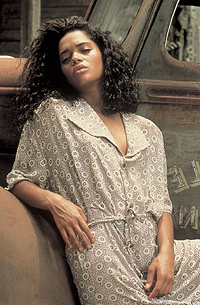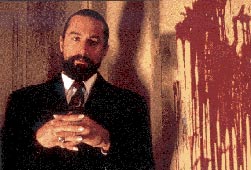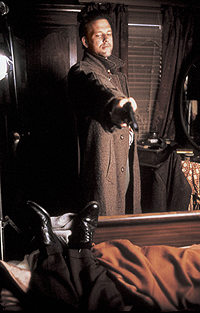 Angel Heart (1987)
Angel Heart (1987)Director: Alan Parker
When the hubbie suggested to me that we watch Angel Heart, I had trouble placing the name. Something about it sounded familiar, but the title isn't exactly distinctive. Slowly, the clouds cleared, and I remembered that this movie marked Lisa Bonet's screen debut and got her kicked off "The Cosby Show." As a matter of curiosity and because Bonet always impressed me as the most interesting of Bill Cosby's television family, I readily agreed to watch the film. That was a very good decision. Angel Heart is a very good movie.
Heading a powerhouse cast that includes Robert De Niro and Charlotte Rampling is Mickey Rourke, an actor with an intensity and vulnerability that invite comparison with Sean Penn. The time is the mid 1950s, and the place is New York City. Rourke plays Harry Angel, a private eye who gets most of his clients from the phone book because he’s one of the first names listed. Harry gets a phone call from an attorney named Herman Winesap (Dann Florek) who wishes to engage his services on behalf of a client, Louis Cyphre (De Niro). Winesap asks Harry to meet them at an address in Harlem, a black church at which a rousing service is taking place. Harry climbs the stairs to the second story and passes an open door. A woman is on her hands and knees scrubbing a large splash of blood off a wall. Winesap moves to greet Harry and motions him toward another room, casually tossing off an explanation for the blood: “A parishioner shot himself.”
Inside the room, Harry is introduced to Cyphre, who is sitting on an ornate chair on what appears to be an altar. Cyphre is rather fussily dressed, sports slicked-back hair, and twists a
 gold-knobbed cane between his pointy fingernails. He tells Harry that he is looking for a singer named Johnny Favorite, nee Liebling, who has skipped out on a debt and has been out of sight for 12 years. Cyphre goes on to say that he happened to catch Liebling's trail at a hospital for brain-injured patients, but that Liebling disappeared from the hospital suddenly one night. With these few clues and a generous retainer in hand, Harry goes about tracking down Johnny Favorite.
gold-knobbed cane between his pointy fingernails. He tells Harry that he is looking for a singer named Johnny Favorite, nee Liebling, who has skipped out on a debt and has been out of sight for 12 years. Cyphre goes on to say that he happened to catch Liebling's trail at a hospital for brain-injured patients, but that Liebling disappeared from the hospital suddenly one night. With these few clues and a generous retainer in hand, Harry goes about tracking down Johnny Favorite.Harry visits the hospital, where he flashes a fake National Institute of Health ID and charms a nurse into showing him Liebling's medical record. Liebling apparently received his injury during WWII. He was checked out during the night by an elegant woman and a man driving a large car. Harry decides to visit Liebling's now semi-retired doctor of record, Albert Fowler (Michael Higgins), to see what he knows. Harry "lets" himself into Fowler's home, which looks like a pigsty. He goes through the place, and finds an unloaded gun in the bedroom dresser. He finds the good doctor's stash of morphine in the fridge. Sitting in the dark, Harry waits for Fowler to return home. When Fowler refuses to provide any useful information, Harry locks him in his bedroom and tells him that he'll get his fix when he decides to talk. With that, Harry repairs to a diner while Fowler stews at home. When Harry returns and turns the skeleton key in the bedroom door, he's in for a shock. Fowler is dead, a bullet through the eye, and beside him the gun from his dresser, a photo of his wife, and a bible Harry gave an idle tap to when he saw it in the drawer. The bible was hollow, a repository for bullets.
Harry must now work the musicians that played with Johnny. He learns that Johnny was involved with a high-class society dame from New Orleans named Margaret Krusemark (Rampling), and that she was into some mighty strange things. Johnny's bandleader Spider Simpson (Charles Gordone) remembers she visited an voodoo herbalist named Carter. He also says Johnny had a colored lover named Evangeline Proudfoot, also from New Orleans. Harry surmises that Margaret was the one who sprung Johnny from the hospital. He heads down to New Orleans to follow the scent.
The shift of scene to New Orleans cranks the tension up several notes. The hints at voodoo
 and primitivism captured in passing in the Harlem church--particularly a figure hidden in deep black veils who will not speak to Harry--come bursting into the hot, sweaty Louisiana sun. Harry visits several of Johnny's former companions, beginning with Margaret, who is a palmist. He gives Margaret his birth date to help her reading. She comments that it is the same as someone she knew. When she realizes Harry is after Johnny, she has him escorted out.
and primitivism captured in passing in the Harlem church--particularly a figure hidden in deep black veils who will not speak to Harry--come bursting into the hot, sweaty Louisiana sun. Harry visits several of Johnny's former companions, beginning with Margaret, who is a palmist. He gives Margaret his birth date to help her reading. She comments that it is the same as someone she knew. When she realizes Harry is after Johnny, she has him escorted out.Harry spies an herbalist store with the same name as the New York shop--Carter. He meets Mammy Carter (Peggy Severe) and inquires about a woman named Evangeline. "Just about everyone around here is named Evangeline," is the quick answer. When he mentions her last name, he learns that she's dead. He heads to the poor side of town to visit her grave. There, he spies a pretty young woman (Bonet) with a child on her hip coming to place flowers on the grave. He learns she is Evangeline's daughter Epiphany, and he is quite attracted to her.
Harry goes off to find another musician Johnny played with named Toots Sweet (jazz/blues great Brownie McGhee). Toots is reluctant to talk about Johnny, but he seems to be hiding something. After the club where Toots is playing closes down, Harry follows him to a clearing in the woods. A hoodoo ceremony is taking place, and Epiphany, the high priestess, is dancing and chanting. She slits the throat of a chicken, smears its blood on her, and writhes and beats her hands on the ground in ecstatic abandon. When Harry sees her the next day, he scold her for the previous night's display. She answers back that it's a free country (though in 1950s Louisiana, it was barely that for blacks) and that they don't kill people. An accusation to Harry?
Perhaps prophetic. Toots is found the next day, choked when his own severed genitals were stuffed down his throat. Harry seems to be implicated. Soon, Margaret turns up dead as well, her heart cut out. Harry is convinced that Johnny is trying to cover his tracks and is framing Harry for the murders. He contacts Cyphre for help, but Cyphre is the last person on earth Harry should be turning to. Cyphre is, in fact, the Devil (Louis Cyphre = Lucifer), not something this movie tries very hard to hide. Clearly, Johnny Favorite owes him a soul, and Lucifer never indulges a welcher.
 Harry's involvement in this dark contract is an intricate one, and the sense of foreboding he feels as he sinks deeper and deeper into its depths is painful and nerve-wracking to watch. Rourke plays Harry as a regular guy who is way in over his head. His dreams and hallucinations reflect his terror and the secrets in his own soul that are starting to be scratched raw. Harry is a noir antihero, not wholly good, but so seeming a victim of circumstances. Rourke works very effectively to draw the viewer into the story to try to figure out the leads along with him, to make sense of a bewildering and terrifying set of events. Harry's fortunes seem very much in doubt, as a recurring image of a slowly spinning fan suggests the wheel of fortune. Where will Harry be when the wheel stops?
Harry's involvement in this dark contract is an intricate one, and the sense of foreboding he feels as he sinks deeper and deeper into its depths is painful and nerve-wracking to watch. Rourke plays Harry as a regular guy who is way in over his head. His dreams and hallucinations reflect his terror and the secrets in his own soul that are starting to be scratched raw. Harry is a noir antihero, not wholly good, but so seeming a victim of circumstances. Rourke works very effectively to draw the viewer into the story to try to figure out the leads along with him, to make sense of a bewildering and terrifying set of events. Harry's fortunes seem very much in doubt, as a recurring image of a slowly spinning fan suggests the wheel of fortune. Where will Harry be when the wheel stops?De Niro is a very good Devil, when he is actually called upon to drop the fey facade. In one scene, he and Harry sit in a diner talking. Cyphre peels and holds a boiled egg in front of him. "Some people say that the soul is like an egg." He proceeds to chew the egg up and swallow it, a humorless, malevolent expression etched on his face. He keeps watch on Harry's progress, and is the unseen hand behind each horrific act Harry witnesses.
Lisa Bonet seems, at first, to overdo her character's sexual nature. However, when we learn that she has been an integral part of the small circle of the blackest magic that surrounded Johnny Favorite, it seems only natural for sex to be part of her devotion. Bonet is absolutely stunning to look at, creating a magnetic field around herself in every scene in which she appears. For her part, the magnificent Charlotte Rampling takes a small role and deftly suggests an obsessed nature inside a gentile shell.
Alan Parker has a checkered record of films he has chosen to make. Mississippi Burning, for example, was lambasted for its flagrant liberties with the facts. His visual flare and ability to pile up suspense, however, can never be questioned, particularly as regards Angel Heart. Assisted by his frequent collaborator, cinematographer Michael Seresin, Parker creates a visually stunning, evocative hothouse where hoodoo and voodoo fit naturally and the ordinary world isn't good enough to rate a cameo. The plot is mazelike, but Parker handles it with a sure hand and perfect pacing. I've seen this film twice and had the same level of suspense each time, so well does Parker suck us in. Angel Heart is pure heaven. l


2 Comments:
At 3:37 AM, Roderick Heath said…
Roderick Heath said…
Angel Heart is indeed a chewy piece o'noir.
For early Mickey Rourke fireworks I also highly recommend Cimino's Year of the Dragon; he positively bounces off the walls, he crackles with so much intensity.
At 8:36 AM, watch movies said…
watch movies said…
I am not a great admirer of 80's movies but still this one is of those few movies that I admire. I was completely drawn into this movie. I found it perfectly paced.
Post a Comment
<< Home